Sustainability Tourism: Development, Impacts, and Business Strategies
VerifiedAdded on 2023/01/04
|10
|2275
|32
Report
AI Summary
This report provides a comprehensive overview of sustainable tourism, beginning with definitions and principles, and then exploring the impacts of tourism, addressing demand and supply issues. It traces the historical development of hospitality and tourism, highlighting contemporary growth rates and changing consumer lifestyles. The report examines key international, UK, and Welsh policy documents related to sustainable development. It also offers practical steps for hospitality and tourism businesses to 'green' their operations, explaining the relationship between sustainable development and marketing. Case studies on sustainable transport, including Greenways/Gower Explorer, Swiss railways, and London Transport, are discussed, along with an analysis of Marriott Hotel's commitment to sustainability, including their 'Spirit to Serve' program and relevant targets. The report concludes by emphasizing the importance of sustainable practices in the tourism sector.

Sustainability tourism
Paraphrase This Document
Need a fresh take? Get an instant paraphrase of this document with our AI Paraphraser
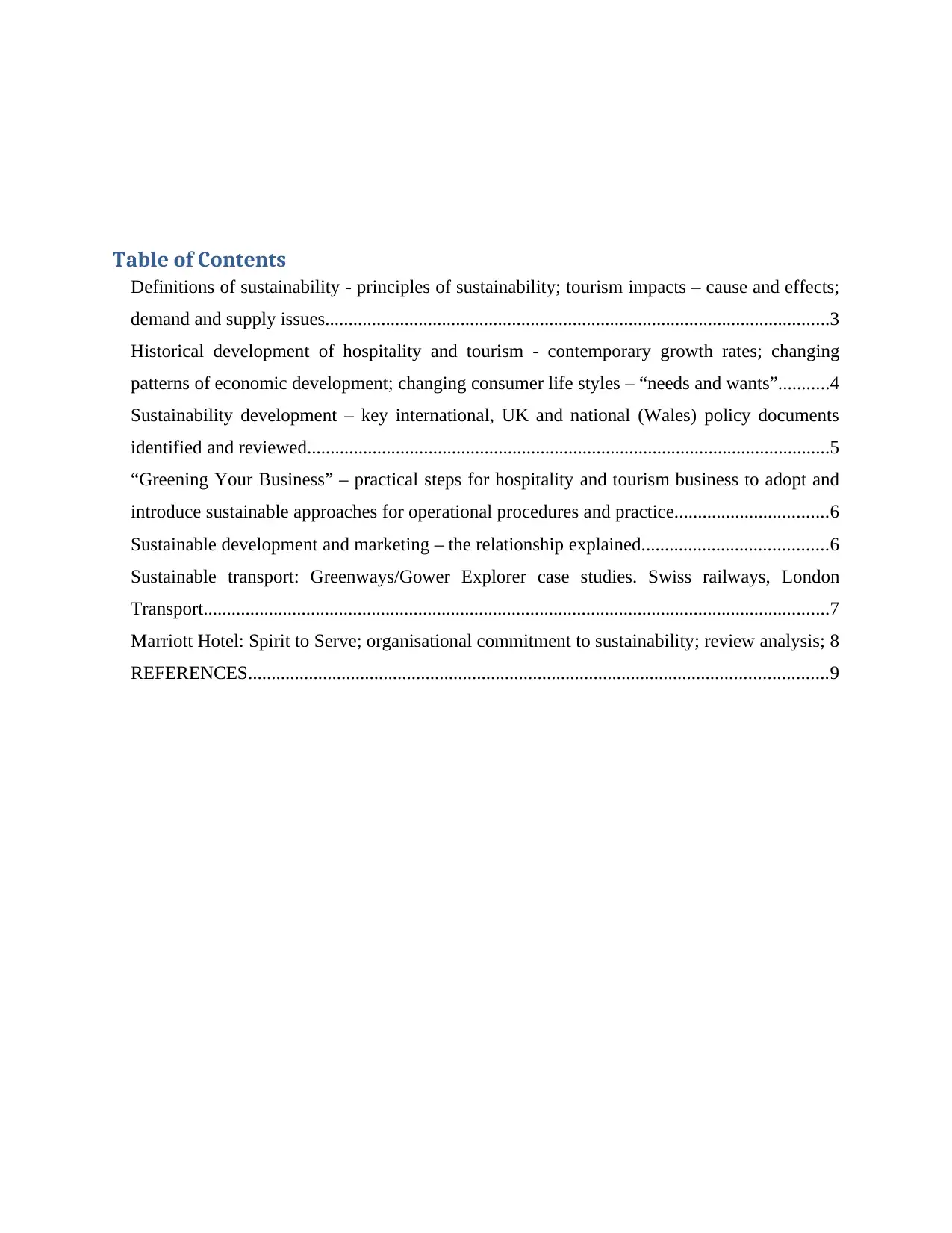
Table of Contents
Definitions of sustainability - principles of sustainability; tourism impacts – cause and effects;
demand and supply issues............................................................................................................3
Historical development of hospitality and tourism - contemporary growth rates; changing
patterns of economic development; changing consumer life styles – “needs and wants”...........4
Sustainability development – key international, UK and national (Wales) policy documents
identified and reviewed................................................................................................................5
“Greening Your Business” – practical steps for hospitality and tourism business to adopt and
introduce sustainable approaches for operational procedures and practice.................................6
Sustainable development and marketing – the relationship explained........................................6
Sustainable transport: Greenways/Gower Explorer case studies. Swiss railways, London
Transport......................................................................................................................................7
Marriott Hotel: Spirit to Serve; organisational commitment to sustainability; review analysis; 8
REFERENCES............................................................................................................................9
Definitions of sustainability - principles of sustainability; tourism impacts – cause and effects;
demand and supply issues............................................................................................................3
Historical development of hospitality and tourism - contemporary growth rates; changing
patterns of economic development; changing consumer life styles – “needs and wants”...........4
Sustainability development – key international, UK and national (Wales) policy documents
identified and reviewed................................................................................................................5
“Greening Your Business” – practical steps for hospitality and tourism business to adopt and
introduce sustainable approaches for operational procedures and practice.................................6
Sustainable development and marketing – the relationship explained........................................6
Sustainable transport: Greenways/Gower Explorer case studies. Swiss railways, London
Transport......................................................................................................................................7
Marriott Hotel: Spirit to Serve; organisational commitment to sustainability; review analysis; 8
REFERENCES............................................................................................................................9
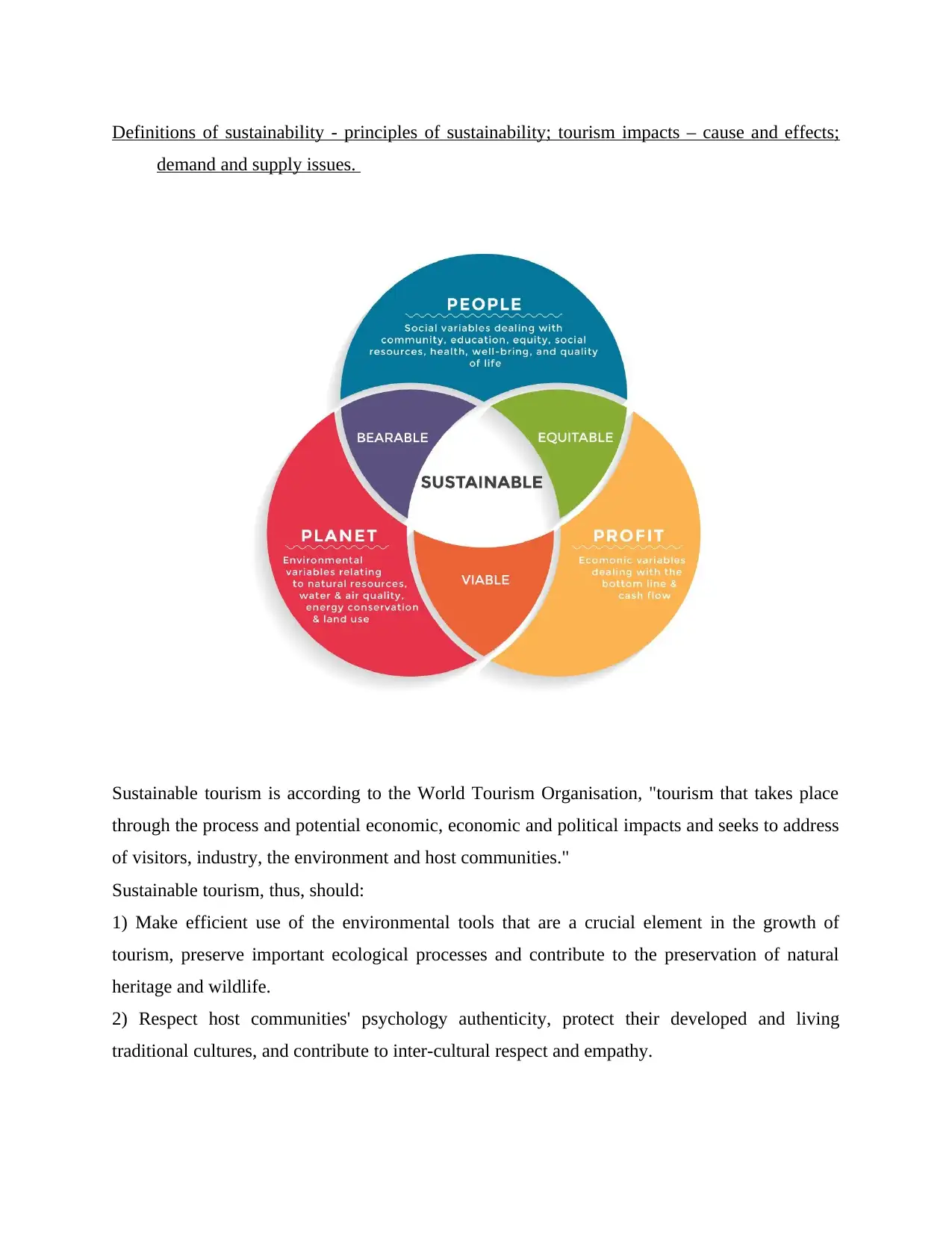
Definitions of sustainability - principles of sustainability; tourism impacts – cause and effects;
demand and supply issues.
Sustainable tourism is according to the World Tourism Organisation, "tourism that takes place
through the process and potential economic, economic and political impacts and seeks to address
of visitors, industry, the environment and host communities."
Sustainable tourism, thus, should:
1) Make efficient use of the environmental tools that are a crucial element in the growth of
tourism, preserve important ecological processes and contribute to the preservation of natural
heritage and wildlife.
2) Respect host communities' psychology authenticity, protect their developed and living
traditional cultures, and contribute to inter-cultural respect and empathy.
demand and supply issues.
Sustainable tourism is according to the World Tourism Organisation, "tourism that takes place
through the process and potential economic, economic and political impacts and seeks to address
of visitors, industry, the environment and host communities."
Sustainable tourism, thus, should:
1) Make efficient use of the environmental tools that are a crucial element in the growth of
tourism, preserve important ecological processes and contribute to the preservation of natural
heritage and wildlife.
2) Respect host communities' psychology authenticity, protect their developed and living
traditional cultures, and contribute to inter-cultural respect and empathy.
⊘ This is a preview!⊘
Do you want full access?
Subscribe today to unlock all pages.

Trusted by 1+ million students worldwide
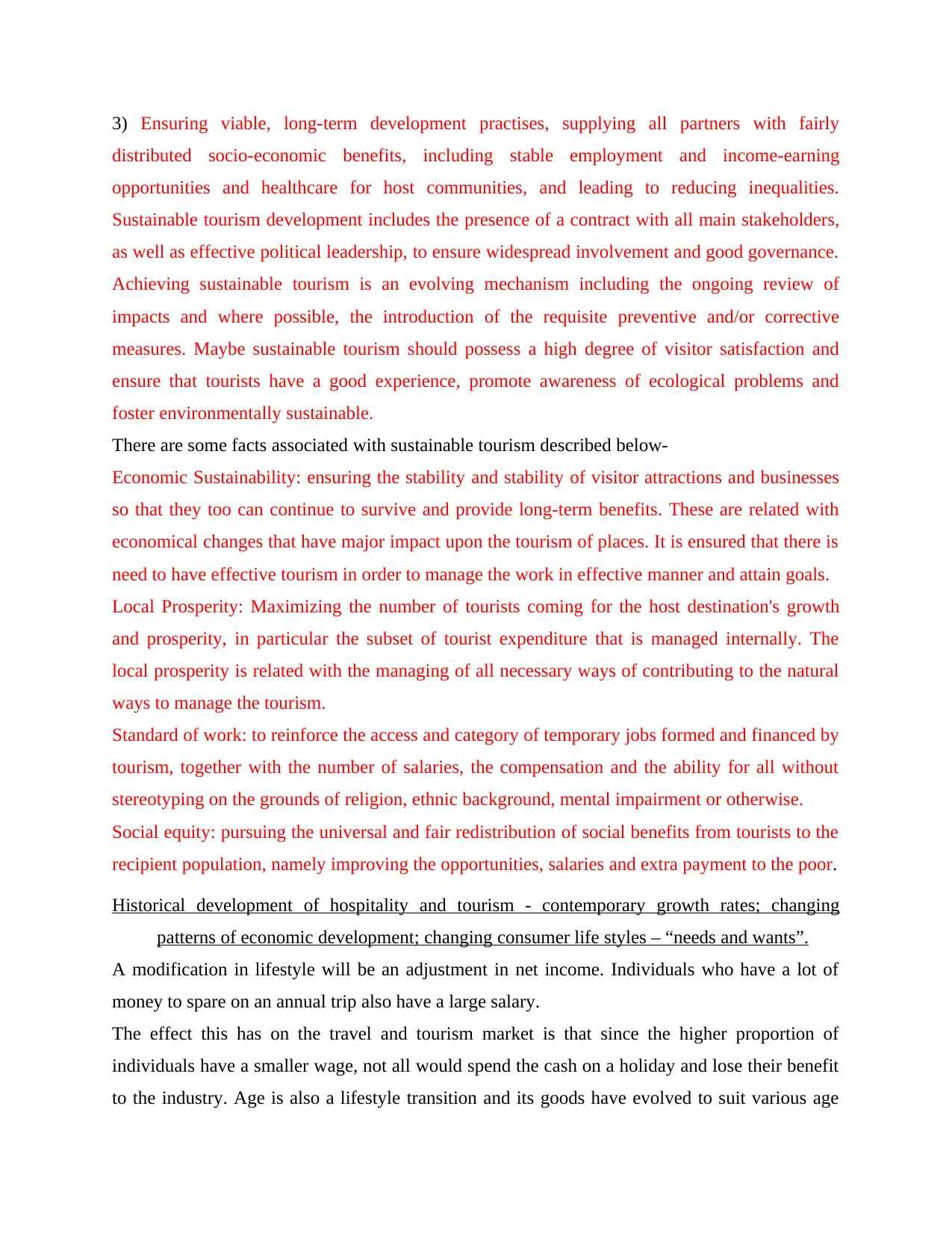
3) Ensuring viable, long-term development practises, supplying all partners with fairly
distributed socio-economic benefits, including stable employment and income-earning
opportunities and healthcare for host communities, and leading to reducing inequalities.
Sustainable tourism development includes the presence of a contract with all main stakeholders,
as well as effective political leadership, to ensure widespread involvement and good governance.
Achieving sustainable tourism is an evolving mechanism including the ongoing review of
impacts and where possible, the introduction of the requisite preventive and/or corrective
measures. Maybe sustainable tourism should possess a high degree of visitor satisfaction and
ensure that tourists have a good experience, promote awareness of ecological problems and
foster environmentally sustainable.
There are some facts associated with sustainable tourism described below-
Economic Sustainability: ensuring the stability and stability of visitor attractions and businesses
so that they too can continue to survive and provide long-term benefits. These are related with
economical changes that have major impact upon the tourism of places. It is ensured that there is
need to have effective tourism in order to manage the work in effective manner and attain goals.
Local Prosperity: Maximizing the number of tourists coming for the host destination's growth
and prosperity, in particular the subset of tourist expenditure that is managed internally. The
local prosperity is related with the managing of all necessary ways of contributing to the natural
ways to manage the tourism.
Standard of work: to reinforce the access and category of temporary jobs formed and financed by
tourism, together with the number of salaries, the compensation and the ability for all without
stereotyping on the grounds of religion, ethnic background, mental impairment or otherwise.
Social equity: pursuing the universal and fair redistribution of social benefits from tourists to the
recipient population, namely improving the opportunities, salaries and extra payment to the poor.
Historical development of hospitality and tourism - contemporary growth rates; changing
patterns of economic development; changing consumer life styles – “needs and wants”.
A modification in lifestyle will be an adjustment in net income. Individuals who have a lot of
money to spare on an annual trip also have a large salary.
The effect this has on the travel and tourism market is that since the higher proportion of
individuals have a smaller wage, not all would spend the cash on a holiday and lose their benefit
to the industry. Age is also a lifestyle transition and its goods have evolved to suit various age
distributed socio-economic benefits, including stable employment and income-earning
opportunities and healthcare for host communities, and leading to reducing inequalities.
Sustainable tourism development includes the presence of a contract with all main stakeholders,
as well as effective political leadership, to ensure widespread involvement and good governance.
Achieving sustainable tourism is an evolving mechanism including the ongoing review of
impacts and where possible, the introduction of the requisite preventive and/or corrective
measures. Maybe sustainable tourism should possess a high degree of visitor satisfaction and
ensure that tourists have a good experience, promote awareness of ecological problems and
foster environmentally sustainable.
There are some facts associated with sustainable tourism described below-
Economic Sustainability: ensuring the stability and stability of visitor attractions and businesses
so that they too can continue to survive and provide long-term benefits. These are related with
economical changes that have major impact upon the tourism of places. It is ensured that there is
need to have effective tourism in order to manage the work in effective manner and attain goals.
Local Prosperity: Maximizing the number of tourists coming for the host destination's growth
and prosperity, in particular the subset of tourist expenditure that is managed internally. The
local prosperity is related with the managing of all necessary ways of contributing to the natural
ways to manage the tourism.
Standard of work: to reinforce the access and category of temporary jobs formed and financed by
tourism, together with the number of salaries, the compensation and the ability for all without
stereotyping on the grounds of religion, ethnic background, mental impairment or otherwise.
Social equity: pursuing the universal and fair redistribution of social benefits from tourists to the
recipient population, namely improving the opportunities, salaries and extra payment to the poor.
Historical development of hospitality and tourism - contemporary growth rates; changing
patterns of economic development; changing consumer life styles – “needs and wants”.
A modification in lifestyle will be an adjustment in net income. Individuals who have a lot of
money to spare on an annual trip also have a large salary.
The effect this has on the travel and tourism market is that since the higher proportion of
individuals have a smaller wage, not all would spend the cash on a holiday and lose their benefit
to the industry. Age is also a lifestyle transition and its goods have evolved to suit various age
Paraphrase This Document
Need a fresh take? Get an instant paraphrase of this document with our AI Paraphraser
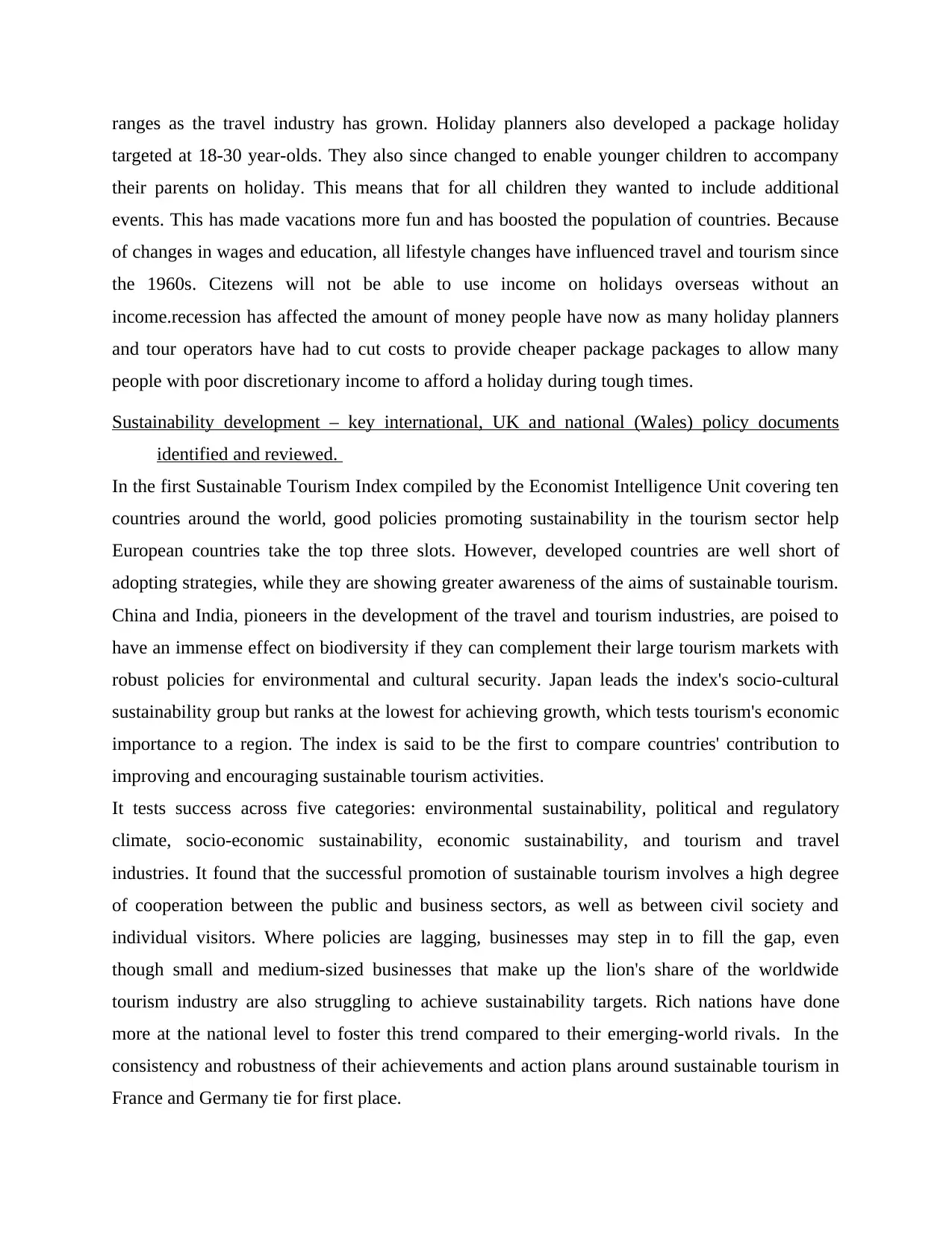
ranges as the travel industry has grown. Holiday planners also developed a package holiday
targeted at 18-30 year-olds. They also since changed to enable younger children to accompany
their parents on holiday. This means that for all children they wanted to include additional
events. This has made vacations more fun and has boosted the population of countries. Because
of changes in wages and education, all lifestyle changes have influenced travel and tourism since
the 1960s. Citezens will not be able to use income on holidays overseas without an
income.recession has affected the amount of money people have now as many holiday planners
and tour operators have had to cut costs to provide cheaper package packages to allow many
people with poor discretionary income to afford a holiday during tough times.
Sustainability development – key international, UK and national (Wales) policy documents
identified and reviewed.
In the first Sustainable Tourism Index compiled by the Economist Intelligence Unit covering ten
countries around the world, good policies promoting sustainability in the tourism sector help
European countries take the top three slots. However, developed countries are well short of
adopting strategies, while they are showing greater awareness of the aims of sustainable tourism.
China and India, pioneers in the development of the travel and tourism industries, are poised to
have an immense effect on biodiversity if they can complement their large tourism markets with
robust policies for environmental and cultural security. Japan leads the index's socio-cultural
sustainability group but ranks at the lowest for achieving growth, which tests tourism's economic
importance to a region. The index is said to be the first to compare countries' contribution to
improving and encouraging sustainable tourism activities.
It tests success across five categories: environmental sustainability, political and regulatory
climate, socio-economic sustainability, economic sustainability, and tourism and travel
industries. It found that the successful promotion of sustainable tourism involves a high degree
of cooperation between the public and business sectors, as well as between civil society and
individual visitors. Where policies are lagging, businesses may step in to fill the gap, even
though small and medium-sized businesses that make up the lion's share of the worldwide
tourism industry are also struggling to achieve sustainability targets. Rich nations have done
more at the national level to foster this trend compared to their emerging-world rivals. In the
consistency and robustness of their achievements and action plans around sustainable tourism in
France and Germany tie for first place.
targeted at 18-30 year-olds. They also since changed to enable younger children to accompany
their parents on holiday. This means that for all children they wanted to include additional
events. This has made vacations more fun and has boosted the population of countries. Because
of changes in wages and education, all lifestyle changes have influenced travel and tourism since
the 1960s. Citezens will not be able to use income on holidays overseas without an
income.recession has affected the amount of money people have now as many holiday planners
and tour operators have had to cut costs to provide cheaper package packages to allow many
people with poor discretionary income to afford a holiday during tough times.
Sustainability development – key international, UK and national (Wales) policy documents
identified and reviewed.
In the first Sustainable Tourism Index compiled by the Economist Intelligence Unit covering ten
countries around the world, good policies promoting sustainability in the tourism sector help
European countries take the top three slots. However, developed countries are well short of
adopting strategies, while they are showing greater awareness of the aims of sustainable tourism.
China and India, pioneers in the development of the travel and tourism industries, are poised to
have an immense effect on biodiversity if they can complement their large tourism markets with
robust policies for environmental and cultural security. Japan leads the index's socio-cultural
sustainability group but ranks at the lowest for achieving growth, which tests tourism's economic
importance to a region. The index is said to be the first to compare countries' contribution to
improving and encouraging sustainable tourism activities.
It tests success across five categories: environmental sustainability, political and regulatory
climate, socio-economic sustainability, economic sustainability, and tourism and travel
industries. It found that the successful promotion of sustainable tourism involves a high degree
of cooperation between the public and business sectors, as well as between civil society and
individual visitors. Where policies are lagging, businesses may step in to fill the gap, even
though small and medium-sized businesses that make up the lion's share of the worldwide
tourism industry are also struggling to achieve sustainability targets. Rich nations have done
more at the national level to foster this trend compared to their emerging-world rivals. In the
consistency and robustness of their achievements and action plans around sustainable tourism in
France and Germany tie for first place.
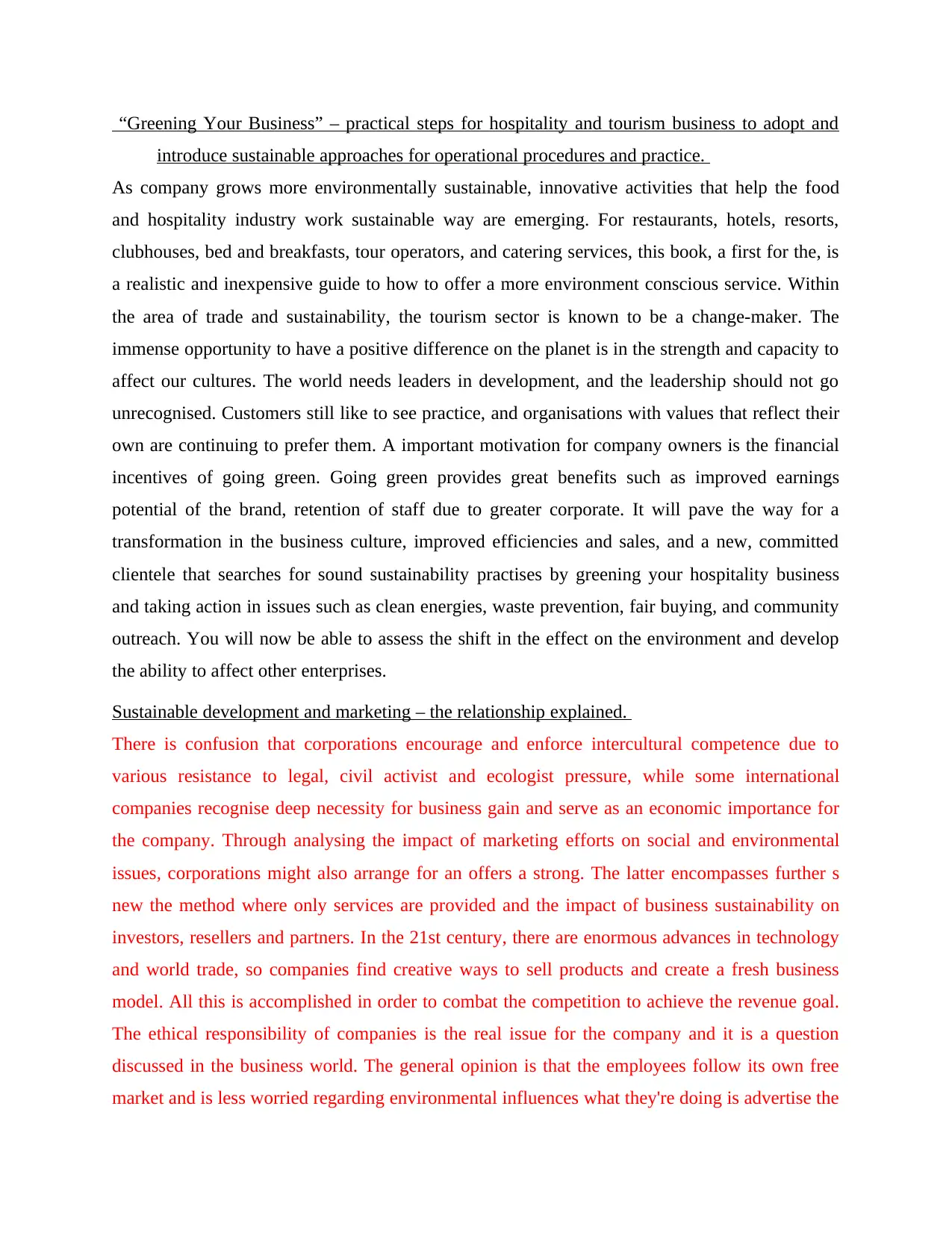
“Greening Your Business” – practical steps for hospitality and tourism business to adopt and
introduce sustainable approaches for operational procedures and practice.
As company grows more environmentally sustainable, innovative activities that help the food
and hospitality industry work sustainable way are emerging. For restaurants, hotels, resorts,
clubhouses, bed and breakfasts, tour operators, and catering services, this book, a first for the, is
a realistic and inexpensive guide to how to offer a more environment conscious service. Within
the area of trade and sustainability, the tourism sector is known to be a change-maker. The
immense opportunity to have a positive difference on the planet is in the strength and capacity to
affect our cultures. The world needs leaders in development, and the leadership should not go
unrecognised. Customers still like to see practice, and organisations with values that reflect their
own are continuing to prefer them. A important motivation for company owners is the financial
incentives of going green. Going green provides great benefits such as improved earnings
potential of the brand, retention of staff due to greater corporate. It will pave the way for a
transformation in the business culture, improved efficiencies and sales, and a new, committed
clientele that searches for sound sustainability practises by greening your hospitality business
and taking action in issues such as clean energies, waste prevention, fair buying, and community
outreach. You will now be able to assess the shift in the effect on the environment and develop
the ability to affect other enterprises.
Sustainable development and marketing – the relationship explained.
There is confusion that corporations encourage and enforce intercultural competence due to
various resistance to legal, civil activist and ecologist pressure, while some international
companies recognise deep necessity for business gain and serve as an economic importance for
the company. Through analysing the impact of marketing efforts on social and environmental
issues, corporations might also arrange for an offers a strong. The latter encompasses further s
new the method where only services are provided and the impact of business sustainability on
investors, resellers and partners. In the 21st century, there are enormous advances in technology
and world trade, so companies find creative ways to sell products and create a fresh business
model. All this is accomplished in order to combat the competition to achieve the revenue goal.
The ethical responsibility of companies is the real issue for the company and it is a question
discussed in the business world. The general opinion is that the employees follow its own free
market and is less worried regarding environmental influences what they're doing is advertise the
introduce sustainable approaches for operational procedures and practice.
As company grows more environmentally sustainable, innovative activities that help the food
and hospitality industry work sustainable way are emerging. For restaurants, hotels, resorts,
clubhouses, bed and breakfasts, tour operators, and catering services, this book, a first for the, is
a realistic and inexpensive guide to how to offer a more environment conscious service. Within
the area of trade and sustainability, the tourism sector is known to be a change-maker. The
immense opportunity to have a positive difference on the planet is in the strength and capacity to
affect our cultures. The world needs leaders in development, and the leadership should not go
unrecognised. Customers still like to see practice, and organisations with values that reflect their
own are continuing to prefer them. A important motivation for company owners is the financial
incentives of going green. Going green provides great benefits such as improved earnings
potential of the brand, retention of staff due to greater corporate. It will pave the way for a
transformation in the business culture, improved efficiencies and sales, and a new, committed
clientele that searches for sound sustainability practises by greening your hospitality business
and taking action in issues such as clean energies, waste prevention, fair buying, and community
outreach. You will now be able to assess the shift in the effect on the environment and develop
the ability to affect other enterprises.
Sustainable development and marketing – the relationship explained.
There is confusion that corporations encourage and enforce intercultural competence due to
various resistance to legal, civil activist and ecologist pressure, while some international
companies recognise deep necessity for business gain and serve as an economic importance for
the company. Through analysing the impact of marketing efforts on social and environmental
issues, corporations might also arrange for an offers a strong. The latter encompasses further s
new the method where only services are provided and the impact of business sustainability on
investors, resellers and partners. In the 21st century, there are enormous advances in technology
and world trade, so companies find creative ways to sell products and create a fresh business
model. All this is accomplished in order to combat the competition to achieve the revenue goal.
The ethical responsibility of companies is the real issue for the company and it is a question
discussed in the business world. The general opinion is that the employees follow its own free
market and is less worried regarding environmental influences what they're doing is advertise the
⊘ This is a preview!⊘
Do you want full access?
Subscribe today to unlock all pages.

Trusted by 1+ million students worldwide
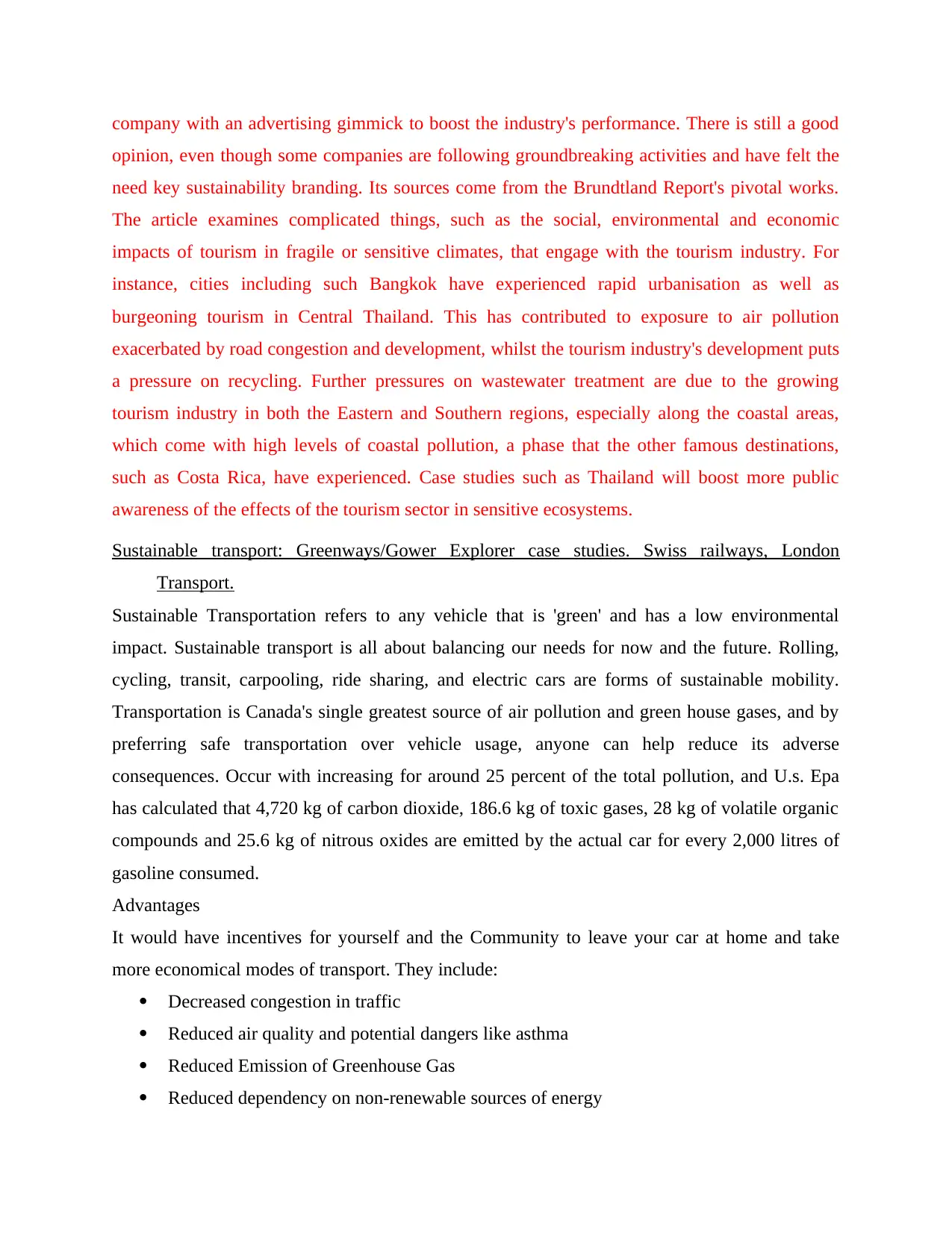
company with an advertising gimmick to boost the industry's performance. There is still a good
opinion, even though some companies are following groundbreaking activities and have felt the
need key sustainability branding. Its sources come from the Brundtland Report's pivotal works.
The article examines complicated things, such as the social, environmental and economic
impacts of tourism in fragile or sensitive climates, that engage with the tourism industry. For
instance, cities including such Bangkok have experienced rapid urbanisation as well as
burgeoning tourism in Central Thailand. This has contributed to exposure to air pollution
exacerbated by road congestion and development, whilst the tourism industry's development puts
a pressure on recycling. Further pressures on wastewater treatment are due to the growing
tourism industry in both the Eastern and Southern regions, especially along the coastal areas,
which come with high levels of coastal pollution, a phase that the other famous destinations,
such as Costa Rica, have experienced. Case studies such as Thailand will boost more public
awareness of the effects of the tourism sector in sensitive ecosystems.
Sustainable transport: Greenways/Gower Explorer case studies. Swiss railways, London
Transport.
Sustainable Transportation refers to any vehicle that is 'green' and has a low environmental
impact. Sustainable transport is all about balancing our needs for now and the future. Rolling,
cycling, transit, carpooling, ride sharing, and electric cars are forms of sustainable mobility.
Transportation is Canada's single greatest source of air pollution and green house gases, and by
preferring safe transportation over vehicle usage, anyone can help reduce its adverse
consequences. Occur with increasing for around 25 percent of the total pollution, and U.s. Epa
has calculated that 4,720 kg of carbon dioxide, 186.6 kg of toxic gases, 28 kg of volatile organic
compounds and 25.6 kg of nitrous oxides are emitted by the actual car for every 2,000 litres of
gasoline consumed.
Advantages
It would have incentives for yourself and the Community to leave your car at home and take
more economical modes of transport. They include:
Decreased congestion in traffic
Reduced air quality and potential dangers like asthma
Reduced Emission of Greenhouse Gas
Reduced dependency on non-renewable sources of energy
opinion, even though some companies are following groundbreaking activities and have felt the
need key sustainability branding. Its sources come from the Brundtland Report's pivotal works.
The article examines complicated things, such as the social, environmental and economic
impacts of tourism in fragile or sensitive climates, that engage with the tourism industry. For
instance, cities including such Bangkok have experienced rapid urbanisation as well as
burgeoning tourism in Central Thailand. This has contributed to exposure to air pollution
exacerbated by road congestion and development, whilst the tourism industry's development puts
a pressure on recycling. Further pressures on wastewater treatment are due to the growing
tourism industry in both the Eastern and Southern regions, especially along the coastal areas,
which come with high levels of coastal pollution, a phase that the other famous destinations,
such as Costa Rica, have experienced. Case studies such as Thailand will boost more public
awareness of the effects of the tourism sector in sensitive ecosystems.
Sustainable transport: Greenways/Gower Explorer case studies. Swiss railways, London
Transport.
Sustainable Transportation refers to any vehicle that is 'green' and has a low environmental
impact. Sustainable transport is all about balancing our needs for now and the future. Rolling,
cycling, transit, carpooling, ride sharing, and electric cars are forms of sustainable mobility.
Transportation is Canada's single greatest source of air pollution and green house gases, and by
preferring safe transportation over vehicle usage, anyone can help reduce its adverse
consequences. Occur with increasing for around 25 percent of the total pollution, and U.s. Epa
has calculated that 4,720 kg of carbon dioxide, 186.6 kg of toxic gases, 28 kg of volatile organic
compounds and 25.6 kg of nitrous oxides are emitted by the actual car for every 2,000 litres of
gasoline consumed.
Advantages
It would have incentives for yourself and the Community to leave your car at home and take
more economical modes of transport. They include:
Decreased congestion in traffic
Reduced air quality and potential dangers like asthma
Reduced Emission of Greenhouse Gas
Reduced dependency on non-renewable sources of energy
Paraphrase This Document
Need a fresh take? Get an instant paraphrase of this document with our AI Paraphraser
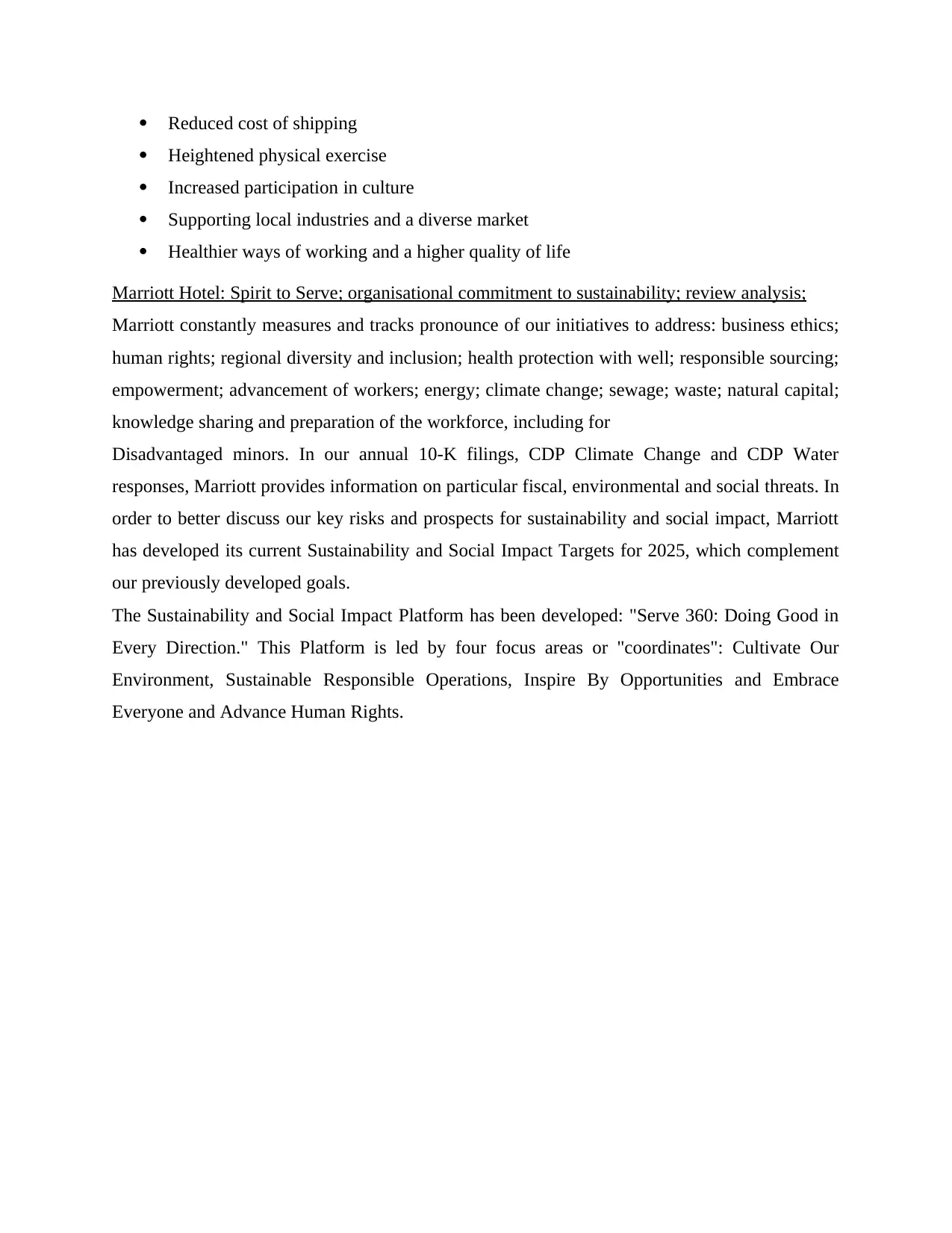
Reduced cost of shipping
Heightened physical exercise
Increased participation in culture
Supporting local industries and a diverse market
Healthier ways of working and a higher quality of life
Marriott Hotel: Spirit to Serve; organisational commitment to sustainability; review analysis;
Marriott constantly measures and tracks pronounce of our initiatives to address: business ethics;
human rights; regional diversity and inclusion; health protection with well; responsible sourcing;
empowerment; advancement of workers; energy; climate change; sewage; waste; natural capital;
knowledge sharing and preparation of the workforce, including for
Disadvantaged minors. In our annual 10-K filings, CDP Climate Change and CDP Water
responses, Marriott provides information on particular fiscal, environmental and social threats. In
order to better discuss our key risks and prospects for sustainability and social impact, Marriott
has developed its current Sustainability and Social Impact Targets for 2025, which complement
our previously developed goals.
The Sustainability and Social Impact Platform has been developed: "Serve 360: Doing Good in
Every Direction." This Platform is led by four focus areas or "coordinates": Cultivate Our
Environment, Sustainable Responsible Operations, Inspire By Opportunities and Embrace
Everyone and Advance Human Rights.
Heightened physical exercise
Increased participation in culture
Supporting local industries and a diverse market
Healthier ways of working and a higher quality of life
Marriott Hotel: Spirit to Serve; organisational commitment to sustainability; review analysis;
Marriott constantly measures and tracks pronounce of our initiatives to address: business ethics;
human rights; regional diversity and inclusion; health protection with well; responsible sourcing;
empowerment; advancement of workers; energy; climate change; sewage; waste; natural capital;
knowledge sharing and preparation of the workforce, including for
Disadvantaged minors. In our annual 10-K filings, CDP Climate Change and CDP Water
responses, Marriott provides information on particular fiscal, environmental and social threats. In
order to better discuss our key risks and prospects for sustainability and social impact, Marriott
has developed its current Sustainability and Social Impact Targets for 2025, which complement
our previously developed goals.
The Sustainability and Social Impact Platform has been developed: "Serve 360: Doing Good in
Every Direction." This Platform is led by four focus areas or "coordinates": Cultivate Our
Environment, Sustainable Responsible Operations, Inspire By Opportunities and Embrace
Everyone and Advance Human Rights.
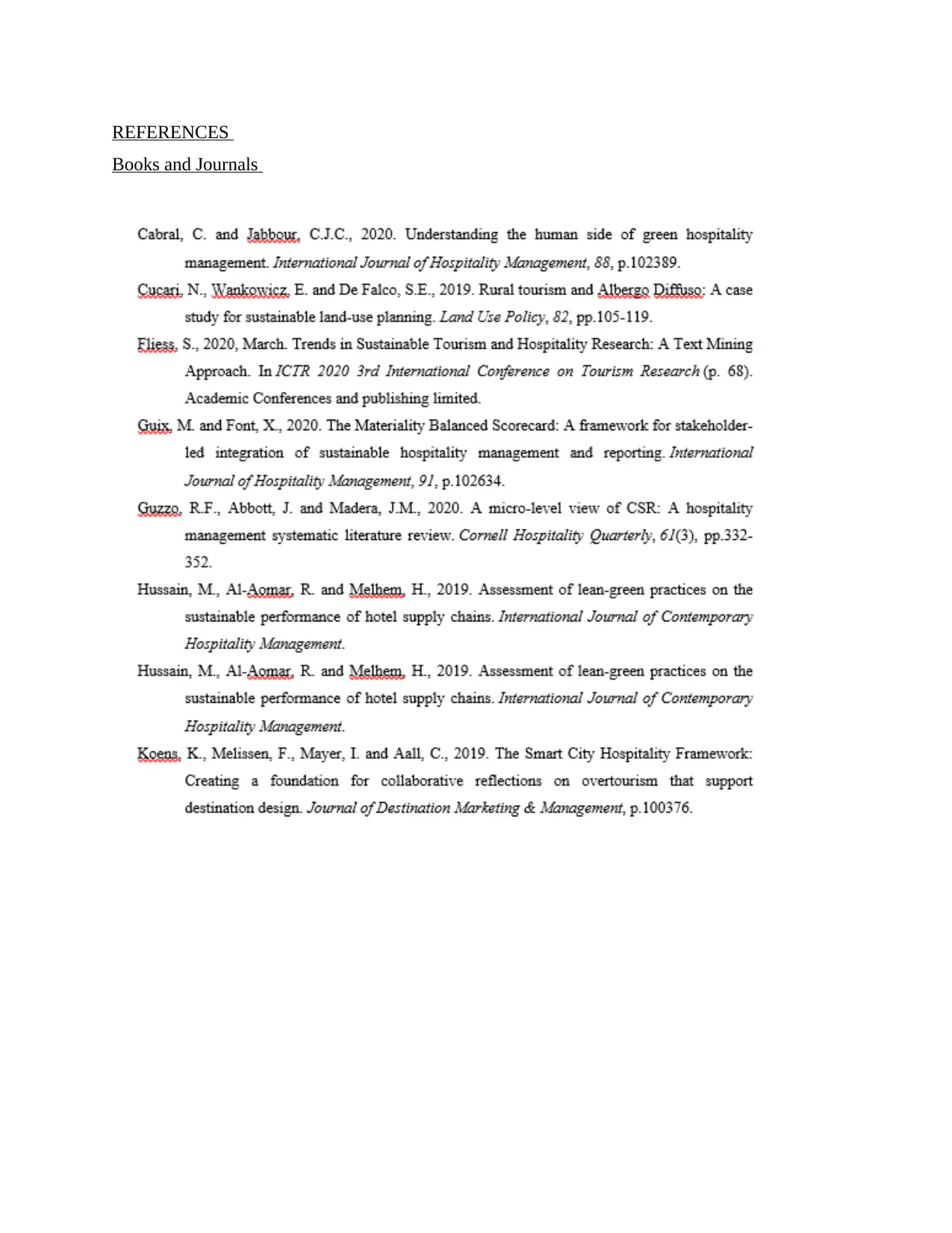
REFERENCES
Books and Journals
Books and Journals
⊘ This is a preview!⊘
Do you want full access?
Subscribe today to unlock all pages.

Trusted by 1+ million students worldwide
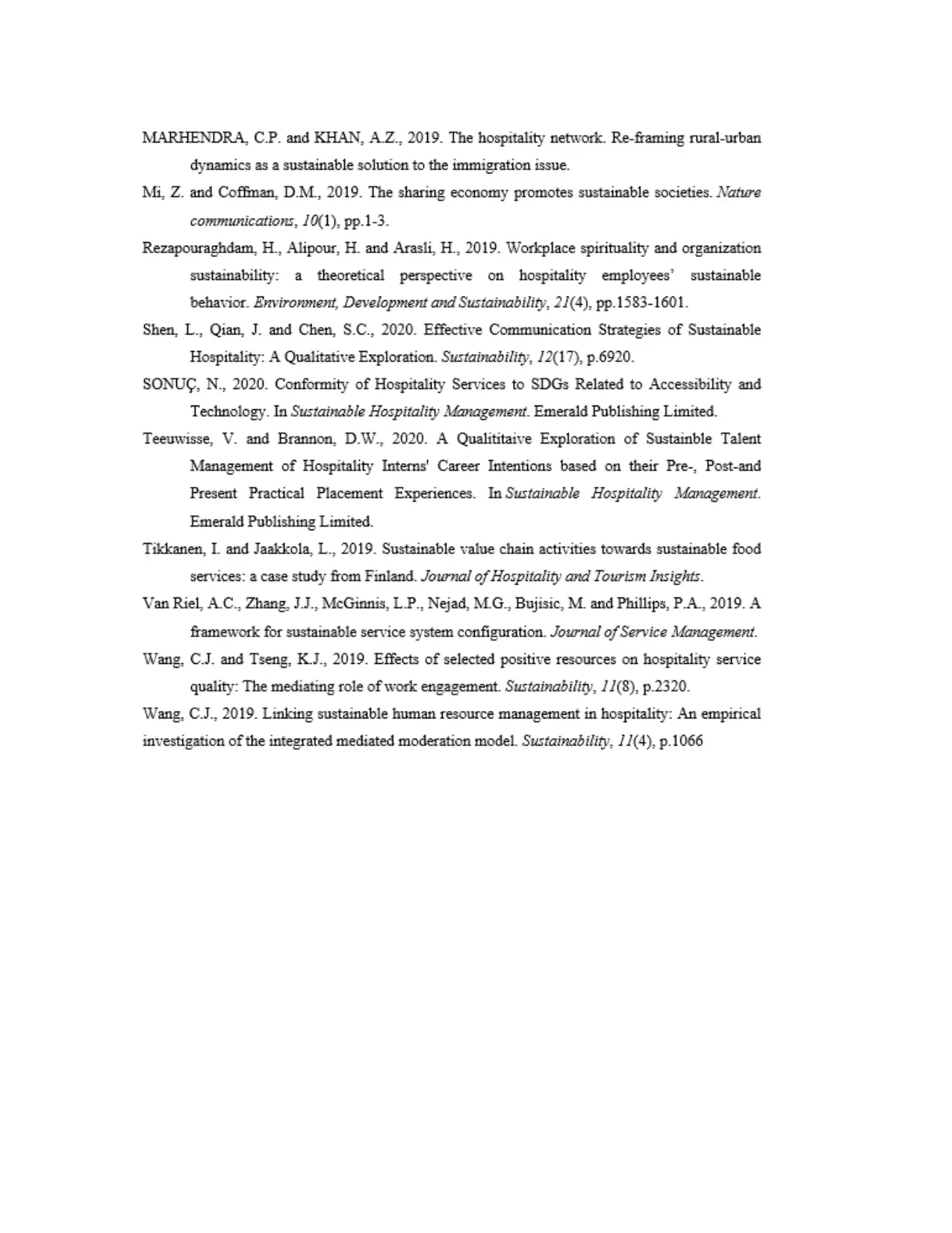
1 out of 10
Related Documents
Your All-in-One AI-Powered Toolkit for Academic Success.
+13062052269
info@desklib.com
Available 24*7 on WhatsApp / Email
![[object Object]](/_next/static/media/star-bottom.7253800d.svg)
Unlock your academic potential
Copyright © 2020–2025 A2Z Services. All Rights Reserved. Developed and managed by ZUCOL.



